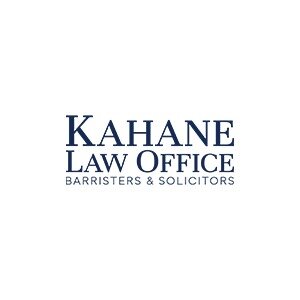Best Labor Law Lawyers in Edmonton
Share your needs with us, get contacted by law firms.
Free. Takes 2 min.
List of the best lawyers in Edmonton, Canada
About Labor Law in Edmonton, Canada
Labor Law in Edmonton, Alberta, encompasses a broad array of regulations and statutes designed to protect both employees and employers in the workplace. This legal framework governs employment relationships, focusing on various issues such as working conditions, employer-employee disputes, wages, benefits, worker’s rights, and discrimination. Alberta's Labor Law aims to ensure fair and safe working environments, reflecting both provincial and federal standards. Understanding these laws is crucial for both employees and employers to maintain compliant and harmonious workplaces.
Why You May Need a Lawyer
There are numerous situations where individuals or organizations may require legal assistance with Labor Law issues in Edmonton. Some common instances include:
- Termination or wrongful dismissal disputes, where an employee believes they were unjustly fired.
- Employment contract negotiations or reviews to ensure terms are fair and compliant with regulations.
- Wage and hour disputes regarding unpaid overtime or insufficient pay.
- Harassment or discrimination claims based on race, gender, age, or other protected classes.
- Health and safety violations where workplace conditions do not comply with legal standards.
- Layoff or redundancy situations needing understanding of legal rights and entitlements.
- Consultation on policies related to employee benefits, leave entitlements, or accommodations.
Legal guidance can help navigate these complex matters, ensuring rights are protected and obligations are met.
Local Laws Overview
Key aspects of Labor Law in Edmonton include the Employment Standards Code, Occupational Health and Safety Act, and Human Rights Act. These laws collectively cover a wide range of employee rights and employer obligations:
- Employment Standards Code: Sets minimum standards for wages, overtime, holiday pay, and termination notice.
- Occupational Health and Safety Act: Ensures the health and safety of workers through regulations and enforcement.
- Human Rights Act: Prohibits discrimination in employment and promotes equality.
Additionally, federal labor laws apply to industries under national jurisdiction, such as banking and telecommunications, adding another layer of regulations for affected entities.
Frequently Asked Questions
What is at-will employment, and does it apply in Edmonton?
At-will employment, common in some jurisdictions, allows employers to terminate employees without cause. This concept does not apply in Alberta; termination must comply with the Employment Standards Code, requiring cause or notice.
How does the law protect against wrongful dismissal?
Wrongful dismissal occurs when an employee is terminated without proper notice or cause. Employees can challenge such dismissals under the Employment Standards Code, which mandates notice periods or severance pay.
What are my rights regarding minimum wage and overtime?
Employees are entitled to receive at least the minimum wage set by Alberta’s government. Overtime pay is required after 8 hours per day or 44 hours per week, at a rate of at least 1.5 times the regular wage.
Can my employer change my job duties without consent?
Significant changes to job duties without employee consent may constitute constructive dismissal, a type of wrongful termination. Legal advice can help determine if such a claim is valid.
What protection do I have from workplace discrimination?
The Alberta Human Rights Act protects employees from discrimination based on race, gender, age, disability, sexual orientation, and other characteristics. Victims can file complaints with the Alberta Human Rights Commission.
Are all employees entitled to vacation pay?
Yes, the Employment Standards Code stipulates that employees must receive vacation time and pay, with specific entitlements based on length of service.
What constitutes a hostile work environment?
A hostile work environment is created by discriminatory, intimidating, or offensive conduct that interferes with an employee’s ability to work. Legal provisions exist to address complaints of such environments.
How can I address unsafe working conditions?
Workers have the right to refuse unsafe work and report unsafe conditions to Occupational Health and Safety authorities, who can investigate and enforce compliance.
Do I need to prove harassment to take legal action?
While evidence strengthens a harassment claim, employees should document incidents and consult a lawyer even if proof seems limited.
Can an employer deny leave for personal reasons?
Employers must comply with statutory leave entitlements like maternity or compassionate care leave, but are not required to grant personal leave beyond legal obligations unless stipulated in a contract.
Additional Resources
Several resources can assist individuals seeking guidance on Labor Law in Edmonton:
- Alberta Employment Standards: Offers information on provincial labor standards.
- Alberta Occupational Health and Safety: Provides guidelines and complaint mechanisms for workplace safety.
- Alberta Human Rights Commission: Assists with filing and investigating discrimination claims.
- Law Society of Alberta: Provides resources for finding qualified labor lawyers.
- Local legal aid services: May offer legal assistance for those who qualify based on income.
Next Steps
If you need legal assistance in Labor Law, consider the following steps:
- Document any incidents or issues thoroughly, as detailed records can be crucial in legal proceedings.
- Consult preliminary resources like guides or helplines provided by governmental bodies to better understand your situation.
- Seek professional legal advice from a qualified labor lawyer to explore your options and receive tailored guidance.
- Contact the Law Society of Alberta or local legal services if you require help finding a lawyer or need cost-effective legal aid.
Taking these steps can help you effectively navigate labor-related legal challenges and ensure fair treatment under the law.
Lawzana helps you find the best lawyers and law firms in Edmonton through a curated and pre-screened list of qualified legal professionals. Our platform offers rankings and detailed profiles of attorneys and law firms, allowing you to compare based on practice areas, including Labor Law, experience, and client feedback.
Each profile includes a description of the firm's areas of practice, client reviews, team members and partners, year of establishment, spoken languages, office locations, contact information, social media presence, and any published articles or resources. Most firms on our platform speak English and are experienced in both local and international legal matters.
Get a quote from top-rated law firms in Edmonton, Canada — quickly, securely, and without unnecessary hassle.
Disclaimer:
The information provided on this page is for general informational purposes only and does not constitute legal advice. While we strive to ensure the accuracy and relevance of the content, legal information may change over time, and interpretations of the law can vary. You should always consult with a qualified legal professional for advice specific to your situation.
We disclaim all liability for actions taken or not taken based on the content of this page. If you believe any information is incorrect or outdated, please contact us, and we will review and update it where appropriate.









